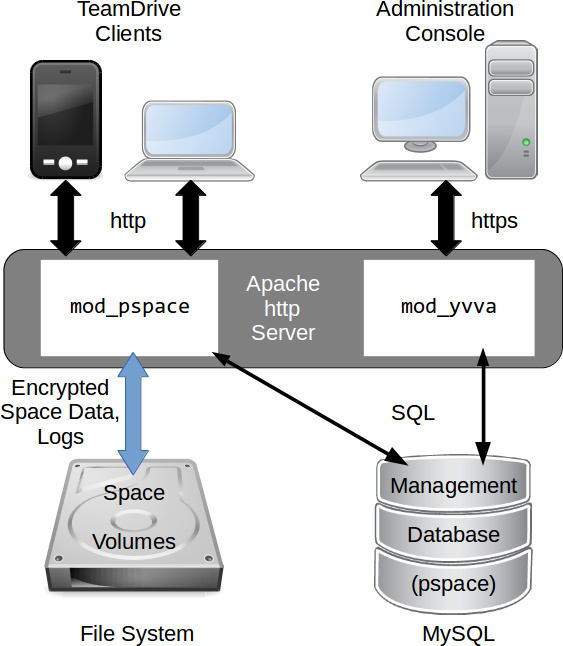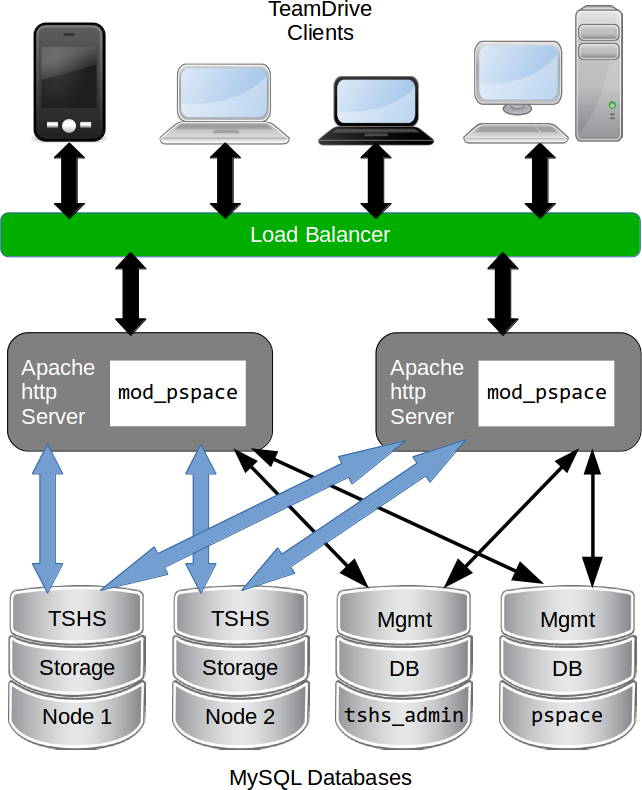Introduction to the TeamDrive Hosting Service¶
TeamDrive Hosting Service Overview¶
The TeamDrive Hosting Service consists of a number of components which are illustrated below:

TeamDrive Hosting Service Overview
The TeamDrive Apache module mod_pspace handles the communication and
exchange of data with the TeamDrive Clients. In the default configuration,
Space data is stored on a regular file system or an NFSv4 share.
The TeamDrive Hosting Service Administration Console and TeamDrive Hosting
Service API is served by the Yvva Apache module mod_yvva.
The list of Spaces, access data, usage statistics and other administrative
information is stored in the Management MySQL Database called pspace.
Additionally, an Amazon S3-compatible object store can be used as second tier
storage. This significantly reduces the load on the first tier storage with
regards to disk space utilization and I/O. In this case, only data “in flight”
like the files being uploaded by the TeamDrive Clients and the Space log files
are stored temporarily on the first tier storage until the upload completed.
Only the so-called last.log files reside permanently on the first tier
storage in this configuration.

TeamDrive Hosting Service using an S3-compatible object store
Afterwards, the files are moved to the object store asynchronously, using the
TeamDrive S3 Daemon s3d. Once they have been transferred to the object
store, mod_pspace fetches the objects in question from there before
serving them to the Clients, thus acting as a proxy.
Alternatively, the Hosting Service can be configured in such a way that
Clients requesting these objects will receive a redirect to the object store
by mod_pspace for obtaining them directly. This helps to offload network
traffic from the Host Server to the object store.
See the chapter Setting up an Amazon S3-Compatible Object Store in the TeamDrive Hosting Service Administration Guide for details.
A storage system combined with the associated web servers is called a TeamDrive Hosting Service. Externally, i.e. from the Registration Server or user’s perspective, the Hosting Service is referred to as a TeamDrive Host Server. However, in this documentation references to TeamDrive Host Server refer to single host instance running an Apache web server and the TeamDrive Hosting Service software.

TeamDrive Scalable Hosting Storage (TSHS)
The illustration above shows a “scaled-out” solution, with several Apache Webservers attached to a TeamDrive Scalable Hosting Storage (TSHS) cluster. See the chapter TeamDrive Scalable Hosting Storage in the TeamDrive Hosting Service Administration Guide for details.
As an alternative to TSHS, a shared file system like NFSv4 or a distributed file system can also be used to store the data.
TeamDrive Hosting Basics¶
When using file system based storage, the data is stored on one or multiple volumes. When using the TSHS cluster for storage, the volume component is ignored. When using a file system, Spaces may be created on any volume that is “operational”.
A TeamDrive Hosting Service requires a unique domain name. The domain
name becomes part of the Space URL that is returned to the TeamDrive Client
when a Space is created on the service. The domain name is also part of the URL
used by the clients to create Spaces, and by the Registration Server to create
new Space Depots. This URL is stored in the ServiceHostURL system setting.
The Same domain name is also used to access Hosting Administration Console Hosting Service API. The default Hosting Administration Console URL is: https://tdhostserver.yourdomain.com/admin/
Note
Note that it is not possible to change the domain name of a Host Server, once the TeamDrive Clients have contacted it to create and access Spaces — the location of Spaces is tied to the Host Server’s host name. However, it is possible to change a Host Server’s IP address, if required.
Directory Structure of Hosted Data¶
The directory structure for space data stored on local storage is as follows:
spacedata
`-- vol01
|-- 1
| |-- protolog
| | |-- last.log
| | |-- last.log.lock
| | `-- 0.log
| `-- data
| |-- D41D8CD98F00B204E9800998ECF8427E
| |-- 7D0F97FC38AE3B2666435D03AA91F352
| `-- 253F19AA30D5346662B3EA83CF79F0D7
`-- 2
|-- data
| |-- 5ACDD4Z000004004U8RGKHSZM2592M8H
| |-- F3XG47Z000004004U8RG1214Z2592M80
| `-- NYFBTSZ000004004U8RFT7Q8A2592M7Y
|-- protolog
| |-- last.log
| `-- last.log.lock
|-- public
| `-- 8CN7S0800000A004UH0Q9TP323BBNZ8E
| `-- Familypicture.jpg
`-- snapshot
|-- last.log
`-- last.log.lock
When Spaces are created, they are evenly distributed across individual
volumes, based on the relative disk space utilization ratio of each available
volume. A Space is identified in the file system by its unique database ID.
The TeamDrive Clients store the data for a Space separated according to
metadata (protolog-directory) and contents (data-directory).
Metadata is appended to a log file and reflects the history of the Space by storing all events (invitations of users, creation of directories, files and all modifications, etc.). All data stored on the Hosting Service is encrypted and only the TeamDrive Clients can decrypt it. It is not possible to read the original space data in the log.
New data is continually added to the data directory in each Space
directory. Existing data is never overwritten, with the exception of data that
has not been uploaded fully and where the upload may restart. File names are
created using a Global Unique ID algorithm in the TeamDrive Clients that
prevents two different clients from creating the same name. When permanently
deleting files (e.g. when emptying the recycle bin of a Space), these files are
deleted on the server, to free up storage space.
The last.log.lock file in each Space is used internally for providing a
reliable locking mechanism to prevent multiple clients from appending data to
the last.log file at the same time. Hence, the underlying storage or file
system needs to support proper file locking (the mod_space Apache module
depends on flock(LOCK_EX) to be reliable).
The public folder contains unencrypted files that have been published
(uploaded) by the TeamDrive Clients. Published files are read-accessible via
HTTP or HTTPS (depending on the server configuration) by anybody, including
users who do not have a TeamDrive Client installed. A TeamDrive Professional
Client license is required to publish files.
Finally, versions 3.2.0 or later of the TeamDrive client support a so-called
“Snapshot” feature, which cuts down the time it takes to enter a Space
considerably. The information required to implement this functionality is
stored in the snapshot subdirectory of a Space.
Spaces, Owners, and Depots¶
All Spaces created on a host are allocated to a specific Space Depot. A Space Depot has a storage quota and traffic limit. TeamDrive Client users require the access information of a Depot in order to create a Space.
If enabled, the TeamDrive Registration Server creates the necessary Depot (called the default Depot) required by the TeamDrive Client during registration of a client. For this purpose the TeamDrive Registration Server must have API access to the Hosting Service.
After the Depot has been created on the Hosting Service, the access information is returned to the TeamDrive Client via the Registration Server. The default Depot is linked to the registration of the TeamDrive Client, and cannot be used by any other user.
The Space Owner and Space information is recorded when a Space is created using the TeamDrive Client.
In addition to the default Depot, additional Depots can also be created manually via the Registration Server’s and the Host Server’s Administration Console. See chapter Manually creating a Depot in the Host Server Administration Guide for details.
Background Tasks Performed by td-hostserver¶
The td-hostserver process is a service running on a Host Server instance that
processes background tasks scheduled by the Hosting Service.
It uses the Yvva daemon yvvad to execute the following background tasks at
a definable regular interval:
- Close Sessions: Each TeamDrive Client needs a valid session for uploading; the session is held in the database. Since the clients do not necessarily have to log out, this process ensures that old sessions are deleted.
- Sum Disk Usage: Sums up traffic and usage of storage space in account Spaces and sets flags where necessary when account limits are exceeded.
- Reset Traffic : On the first day of each month the traffic for all
Spaces and Depots is reset to 0. If the
SpaceStatisticEnabledconfiguration setting is set toTrue, a monthly report containing detailed statistics like monthly traffic and disk usage for all existing Depots and Spaces within these depots will be created. See the chapter “Reporting Usage Statistics” in the Host Server Administration Guide for details. - Check Spaces with Limit: When Spaces exceed their storage or traffic limit, this checks whether the Depot has dropped back below the limit.
- Delete Space: TeamDrive Clients can request the deletion of a Space by
setting its status to “TO-DELETE”.
td-hostserverautomatically detects Spaces with this status and removes all associated folders and files from the file system of the associated Host Server. After deleting all files,td-hostserverchanges the corresponding Space status to “DELETED”. - Process S3 Logs: Background task to calculate the traffic usage on an object store as described in the chapter “Enabling Object Store Traffic Usage Processing” in the Host Server Administration Guide for details.
- Notify Volume: Checks the disk utilization of Space Volumes and sends out a notification email if the usage exceeds a configurable level.
- Clean up API log: Removes entries from the API log table older than 30 days.
- Delete Public Files: Remove published files that have reached their expiry time.